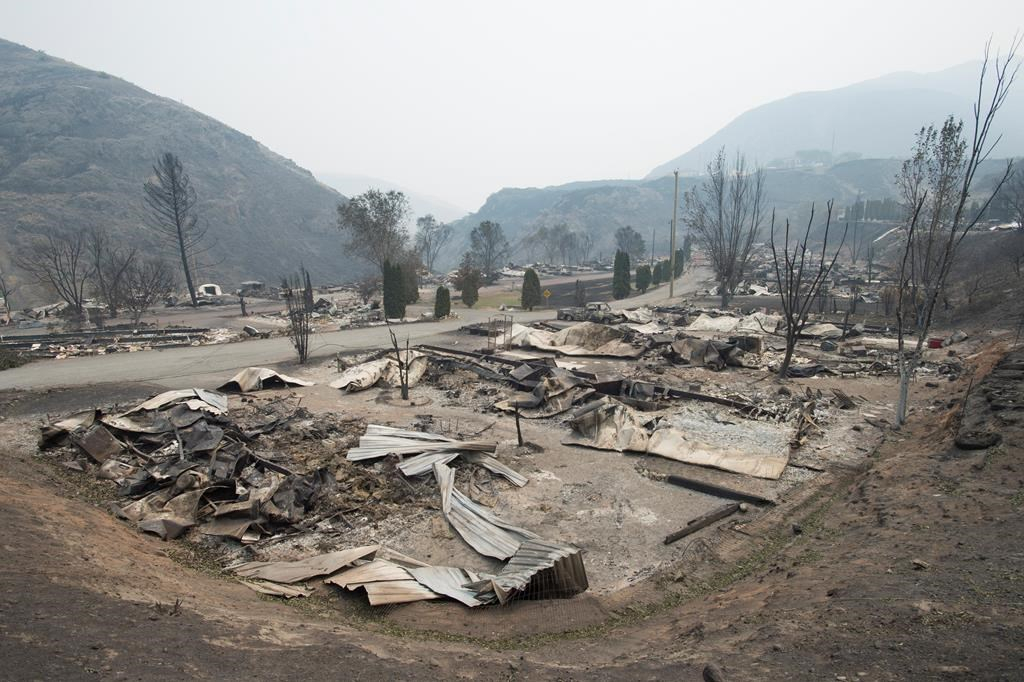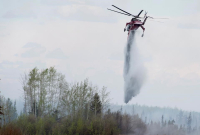Support strong Canadian climate journalism for 2025
Emergency officials and police are urging British Columbia residents to respect evacuation orders ahead of fast−moving wildfires, but some First Nations are standing their ground, successfully protecting their homes and property.
The chief of the Tl’etinqox First Nation said RCMP officers told them to leave or risk having their children taken away. Instead they erected a fire boundary and prepared to fight.
"We are generation after generation that continue to live in a fire zone. This is not new to us," said Chief Joe Alphonse, whose community is about 100 kilometres west of Williams Lake. "We feel this is the safest place for our community members to be."
There are about 1,000 residents on the reserve, but Alphonse said only about 300 stayed to fight the fires.
BC Wildfire Service chief information officer Kevin Skrepnek said there had been a slight reprieve in the weather forecast with some rain expected, bringing relief to the windy, hot and dry conditions fuelling nearly 200 fires and displacing more than 14,000 people.
Crews took advantage of calmer conditions Wednesday to make progress on fire guards near Williams Lake, where 10,000 people remain on evacuation alert.
With improved conditions, Alphonse said he finally had a moment to reflect on the three days of fire fighting without the aid of power or telephone service.
He said Mounties told them to evacuate last weekend and the conversation quickly became heated.
As chief, he said his signature is required to enforce the evacuation order on the reserve, which he chose not to authorize.
Robert Turner of Emergency Management BC said Alphonse was correct. First Nations have the authority to issue their own evacuation orders for their territory.
"They would hopefully be taking advice from the same experts as a local government," he said.
Alphonse said many in the community wanted to stay behind to fight and they have trained firefighters, access to heavy equipment and emergency plans to evacuate if they lost the battle with the fire.
He said an officer threatened to have the Ministry of Children and Family Services "remove all the children."
Tempers flared and Alphonse said he suggested their own roadblocks would keep the Mounties out and if that didn’t work, perhaps warning shots above their heads would.
RCMP Staff Sgt. Annie Linteau said in a statement Wednesday, "as far as the comments made by Chief Alphonse, we do not believe the comments made are reflective of the recent and continued meetings and conversations we have had with the chief."
The RCMP’s responsibility is to "advise the public that there has been an order and advise them of the risk associated with staying," Linteau told reporters on a conference call.
"Of course, if the person has the ability to make their own decision and they are over the age of 19, we will not force them to leave the home," she said.
But she said if there are children under 19 at risk, police are required to move them to a safe location. No children have been removed by the RCMP to date, she added.
Alphonse disagrees that officers were trying to protect their children.
"The safest place for our kids is here with their families under the supervision of the leadership of this community," he said.
The Union of B.C. Indian Chiefs said Indigenous Peoples have a fundamental right to make decisions about protecting and defending the safety, health and well−being of their community.
"If and when houses and band infrastructure are lost to these fires, it will take years to rebuild and we fear in many instances the homes and infrastructure may never be built," said Grand Chief Stewart Phillip.
Indigenous and Northern Affairs Canada said in a statement that the department is working with Emergency Management BC and First Nations to make sure the communities are supported.
B.C. Forest Minister John Rustad told radio station CHNL that the province was concerned about the situation.
"People are staying behind, they want to fight for their homes. That poses a very serious problem. We know these fires can be very, very volatile and can change at a moments notice," Rustad said.
Ultimately, Alphonse said staying was the right decision and it saved at least 10 homes.
The chief of the Bonaparte Indian Band north of Ashcroft said they also defied an evacuation order over the weekend and successfully stopped flames from overrunning their reserve.
"My community has some really skilled firefighters, like a lot of First Nations reserves, and they came together and they stopped that wildfire from wiping out that whole community," Chief Ryan Day said.
He said 60 of the band’s 280 members stayed to fight the fire.
The community doesn’t have a firehall, a new water reservoir hasn’t been connected to their main supply yet and they don’t have a formal emergency response plan in place.
But Day said the experience of the trained forest firefighters in his community and access to heavy equipment contributed to their success.
"We weren’t prepared for it of course because it happened in a blink of an eye, but we snapped into action and everyone did their part," he said.
— By Linda Givetash in Vancouver, with files from Laura Kane




Comments